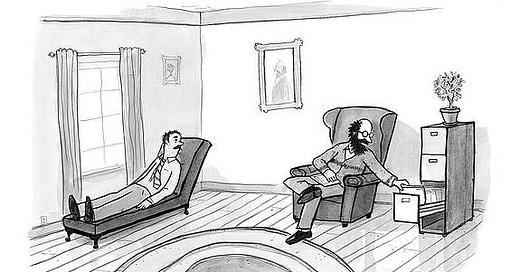Why Do Now What You Could Do Later?
On New Years resolutions, procrastination, and understanding how you work.
I’ve always liked the idea of New Year’s resolutions, but I’ve never been much for the practice. There’s something undeniably intoxicating about the notion of reinvention. The New Year, New Me myth. It just never seems to pan out.
The idea of deadline driven new beginnings and dramatic life changes facilitated by grand insights has been so debunked for me, that I even named my coaching/consulting business after Tuesday, the least notable day of the week. A day which begs the question (to me at least) how does one stay focused on/committed to/engaged in something after they’ve begun, but before the end is in sight? That is, how do you progress when progress is slow and maybe even not apparent?
I like this concept because it reminds me that real change most often starts very small, grows incrementally, doesn’t feel good, and is the result of having good systems to invest yourself into, rather than “Big Hairy Audacious Goals” to keep you motivated.
When I was in graduate school for consulting psychology (think Venn diagram overlap between organizational and counseling psych), one of the requirements I had to fulfill was for a “personal growth experience.” The goal of this requirement was to encourage students to participate in some form of the therapy/coaching they may find themselves delivering in the future.
The requirement was for 40 hours of development, and options ranged from 40 weeks of 1:1 therapy, to weekend-long group Gestalt experiences that could knock the requirement out in three days. To me, it seemed like a good excuse to go to therapy under the guise of “I have to do it for school.” I also knew I wanted to do individual coaching after school, so I figured the 1:1 experience would be a good fit.
One thing that quickly became apparent was that I tend not to experience the way I do things as “the right way” to do things. I always feel the need to be more diligent, more proactive, more sanguine, more independent, more _________.
In this regard, my main concern in these counseling sessions was that I’m an inveterate procrastinator, that I could not bring myself to start writing an essay or a paper until the impossible last minute, and that this fact would inevitably lead me to trying to write my dissertation during an epic all-nighter. A stunt which would simply not work.
I wanted to change this about myself - no more procrastination - so that I could graduate on time.
The counselor I chose to work with had a somewhat eclectic background. He had an MBA, a PhD in clinical psychology, and had trained as a psychoanalyst. He managed a therapy practice, worked as an executive coach, was into crossfit, and sometimes taught business courses as an adjunct professor. This is all to say, it was never clear whether he was going to want to explore the childhood origin of some neurosis, or give me practical tips from his own dissertation writing process.
What has always stuck with me from this experience was his take on my procrastinating: “Do you miss deadlines?” (No) “Are you happy with your grades?” (Yes). “Then what’s the problem?” (…)
I was calling it procrastination, I was stressed about being “a procrastinator,” not necessarily about what I was getting done and how. Maybe pressure helped narrow my focus. And maybe the lead up to the output was part of the work too, mulling over the thing to be written, letting it knock around in my head a bit before sitting down to write. “Maybe it’s not procrastinating,” he’d said, “maybe it’s just how you work.”
To me, this was revelation.
Maybe the problem wasn’t that I needed to change myself in order to do what I wanted to do, but that I just needed to learn how to use my way of working in a different way, on a bigger project.
This shift in perspective helped open up new possibilities for how I might work on my dissertation (which I did get done!) and gave me the freedom - although I admit I don’t always have access to it - to just let my procrastinator self be me.
Apply this thinking
What part of yourself are you consistently trying to change? What belief is animating the thought that it needs to be changed?






Somewhere between the self-flagellating demands of constant "improvement" and the passive decline of an Alfred E. Neuman "What, me worry?" is the kind of self-understanding and acceptance you write so beautifully about, Ross. Good reminder at the year's turning.
Thanks so much for the comment and the generous reading Doug. Happy New Year.